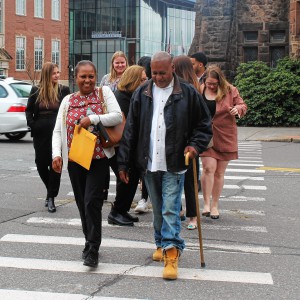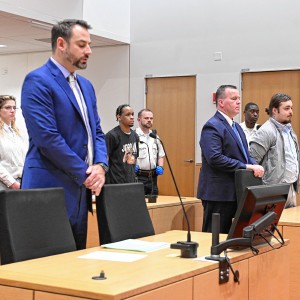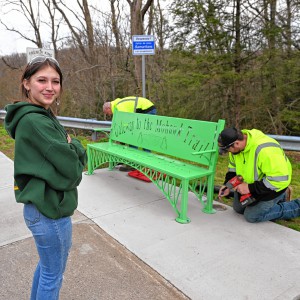Book Bag: Debut novel by Dean Cycon tells the story of a fraught WWII homecoming for Holocaust survivors
| Published: 07-21-2023 12:18 PM |
Finding Home (Hungary, 1945)
By Dean Cycon; Koehler Books
A common image from the end of World War II in Europe is that of cheering crowds of people welcoming Allied troops in towns and cities that had been liberated from the Nazis.
A lesser-known and much grimmer story from that era is what happened when some Holocaust survivors returned to their hometowns after the war — to face hatred and violence from residents who didn’t want them back.
That scenario is at the heart of “Finding Home (Hungary, 1945),” the debut novel by Dean Cycon, the founder and former president of Dean’s Beans, the organic coffee business in Orange that he started in 1993. (The company recently became a worker cooperative following Cycon’s retirement.)
Cycon, who lives in Leverett, sets much of his story in the fictional town of Laszlo, in eastern Hungary, where in late May 1945, a few weeks after the fighting in Europe has ended, a handful of Jewish residents return by train after surviving months of imprisonment in German concentration camps.
A central character is 18-year-old Eva Fleiss, a talented classical pianist who kept herself alive in Auschwitz in part by imagining herself playing the piano, then imagining returning home to play the instrument for real in her father’s house. She also hopes to be reunited with her father, who along with her and Laszlo’s other Jewish residents had been abruptly deported from the town a little over a year ago.
Article continues after...
Yesterday's Most Read Articles
 Greenfield homicide victim to be memorialized in Pittsfield
Greenfield homicide victim to be memorialized in Pittsfield
 Former Greenfield man granted new trial after 1995 murder conviction, walks free
Former Greenfield man granted new trial after 1995 murder conviction, walks free
 On The Ridge with Joe Judd: What time should you turkey hunt?
On The Ridge with Joe Judd: What time should you turkey hunt?
 Judge sets bail for Millers Falls assault suspects
Judge sets bail for Millers Falls assault suspects
 Franklin Tech student welds artistic bench for French King Bridge
Franklin Tech student welds artistic bench for French King Bridge
 As I See It: Between Israel and Palestine: Which side should we be on, and why?
As I See It: Between Israel and Palestine: Which side should we be on, and why?
Eva is accompanied by a few older Jews from Laszlo: a baker, a butcher, and two farmhand brothers, along with an Orthodox Jew from a nearby village, all of them wondering what they’ll find back home.
The answer’s not good. Some discover their homes and businesses have been taken over by other residents, while the rest of Laszlo’s Jewish residents are apparently dead or scattered elsewhere; many townspeople seem indifferent or embarrassed to see the returnees.
Others are openly hostile. One elderly man, looking at the thin, raggedly dressed survivors as they trudge into town, shakes his cane at them and spits, “See what a Jew looks like shorn of his fancy clothes and arrogance.”
In an interview, Cycon, who’s previously written nonfiction, said he came to the subject of his novel by way of research he was doing about six years ago on early Jewish trade routes in Europe.
In the process, he says, he stumbled across an account of a pogrom in Kielce, Poland, in July 1946, in which a false story that a Jewish man had kidnapped a Christian boy led police, Polish soldiers, and residents to attack a Jewish community center that housed Holocaust survivors.
Over several hours, 42 Jews, including women and children, were murdered, and over 40 injured. Many of the victims were beaten or stoned to death.
“I thought, ‘How is it I’m just hearing about this?’” said Cycon, who is Jewish. “And then I did some more research and discovered this was not a one-off incident. There were accounts all across Europe after the war of (Holocaust) survivors being attacked when they returned home or discovering their property had been taken.”
Cycon made two visits to Hungary to talk to academics and historians about similar incidents in that country; with the help of an interpreter, he also spoke with some Jewish survivors and their descendants about their post-WWII experiences.
He says he decided to try and tell the story as a novel – “I’ve been wanting to turn to fiction for years,” he said with a laugh – in part because the subject seems to have gotten little if any attention in popular fiction, and because a novel makes the history more accessible to general readers.
Why set it in Hungary, though? In this case, Cycon notes that most Jews in prewar Hungary were well assimilated, seeing themselves primarily as Hungarians. And deportation of the Jewish population didn’t start until after March 1944, when Germany invaded its wartime ally, installed a fascist puppet government led by the Arrow Cross Party, and hurriedly began shipping Hungarian Jews to Auschwitz.
“Hungary kind of stood out because the Jewish population had been able to avoid the worst of what had happened in the rest of Europe,” Cycon said. “Then the Holocaust arrived in a kind of fury, and after the war some (Hungarian) Jews who returned home found people had turned on them.”
“Finding Home” is not a completely black-and-white story. When Eva and her fellow survivors return to Laszlo, they do find some support, including from the town’s mayor, a basically decent man who looks for ways to help the Jewish returnees get back on their feet without stirring up animosity from other residents. For the meantime, the town houses them in an old hotel.
But there’s plenty of indifference and hostility, too, as well as some general weirdness. Eva, who grew up pretty well-to-do – her still-absent father, Jacob, was a lawyer – is astounded to find a strange woman living in her house when she knocks on the door. It turns out she’s the mayor’s wife, Greta, and she’s not happy to see this bedraggled teen on the doorstep.
The mayor, though, explains to his wife that they’ve only taken possession of the house, per Jacob’s past instructions, to prevent it from being vandalized while vacant. The couple work out an agreement to have Eva do some cleaning in the home in return for regular practice time on the piano, as Eva hopes to fulfill her dream of being accepted at a prestigious music center in Budapest.
Cycon tells the story from the perspective of several characters, including the butcher, Oskar, full of grief from the loss of his son at Auschwitz and anger at the way Laszlo has treated – and continues to treat – its Jewish residents: “There is so much hatred under the surface, always has been.”
The train station master, meanwhile, loses himself in drink, as he’s tormented by guilty memories of the role he played in early spring 1944 when Nazi officials and local police rounded up Laszlo’s Jews for “resettlement,” an incident that some residents cheered on at the time.
“There are so many complex moral, political, and economic dynamics at play in this story,” Cycon said. “There’s guilt, resentment, fear in some cases that Jews will come back and reclaim a business or home that people have taken over to improve their own lives... a lot of people didn’t know how to deal with the situation.”
Some of Laszlo’s residents maintain they’ve suffered, too, having lost fathers, sons and brothers in the fighting against the Russians while dealing with deprivations at home under the Nazis and the Arrow Cross. But others take a line seen all too often during that era: blaming the Jews for all their misfortunes.
Could Eva’s music be a key to some kind of healing? All agree she’s a major talent, and Greta for one soon warms to her and confesses her guilt in living in Eva’s home. Eva, despite her own grief and anger, finds herself drawn closely to Judaism for the first time in her life.
But if she goes to Budapest, what will she find? A place for truly immersing herself in music? Or just a bombed-out city still dealing with its own currents of anti-Semitism? And is there a threat of renewed violence against the few Jews remaining in Laszlo?
“Finding Home” poses these and other intriguing questions, while reminding readers that the horrors of WWII lingered on well after the guns stopped firing.
Steve Pfarrer can be reached at spfarrer@gazettenet.com.

 Sounds Local: Broadway star returns to Greenfield for concert: Kevin Duda to sing with Franklin County Community Chorus this Sunday
Sounds Local: Broadway star returns to Greenfield for concert: Kevin Duda to sing with Franklin County Community Chorus this Sunday Sharing the gift of spring: The tradition of making May Baskets for May Day
Sharing the gift of spring: The tradition of making May Baskets for May Day Tips for planning a successful garden: Creating a healthy garden is all about maintaining good habits
Tips for planning a successful garden: Creating a healthy garden is all about maintaining good habits Speaking of Nature: Bird of my dreams, it’s you: Spotting a White-tailed Tropicbird on our cruise in Bermuda
Speaking of Nature: Bird of my dreams, it’s you: Spotting a White-tailed Tropicbird on our cruise in Bermuda
